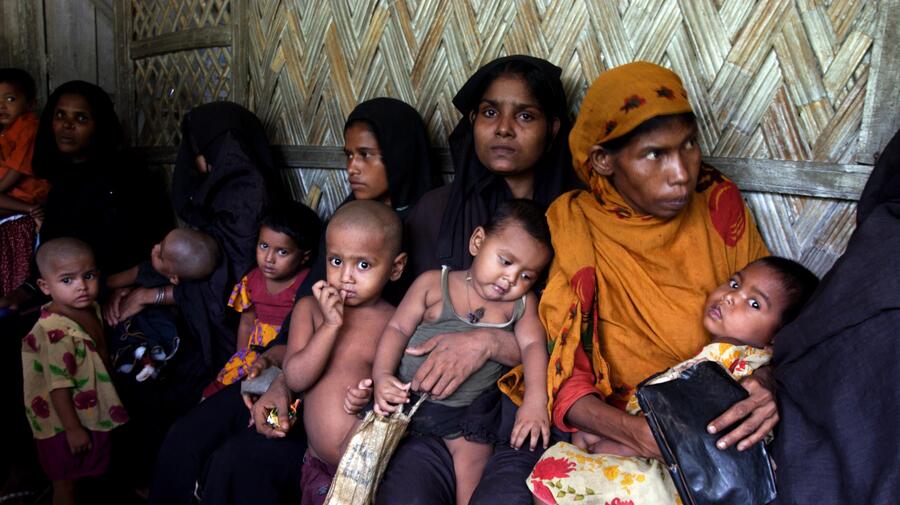UNHCR chief reiterates commitment to prevention of sexual violence
UNHCR chief reiterates commitment to prevention of sexual violence

A group of refugee women wait to see the doctor in a Bangladeshi camp. Forcibly displaced women are vulnerable to abuse.
GENEVA, November 25 (UNHCR) - UN High Commissioner for Refugees António Guterres stressed on Wednesday that his agency was fully committed to the prevention of sexual violence, which he said needed a personal as well as a collective response.
"Gender-based violence is one of the most virulent, culturally endemic, and persistent trends in the world," Guterres noted in a special message to staff to mark the start of the annual 16 Days of Activism to Eliminate Violence Against Women, an international campaign originating from the first Women's Global Leadership Institute in 1991.
"Sexual violence is a brutal form of physical and psychological warfare rooted in the gender inequality extant not only in zones of conflict, but in our everyday personal lives," said the High Commissioner, who described sexual violence as a major global security concern.
"The persistence of such forms of violence undermine peace and security and shatter community and family ties. It demands a personal as well as a collective response," he stressed, while adding: "The prevention of sexual violence must remain one of our highest priorities."
Gender-based violence is one of the most virulent, culturally endemic, and persistent trends in the world.
António Guterres
Guterres said preventing and responding to sexual and gender-based violence was increasingly integrated into UNHCR's efforts on physical protection, health, access to psycho-social support and justice, livelihoods, community empowerment and durable solutions.
He pledged that the refugee agency "will, along with other UN agencies, increasingly assist states in their efforts to prevent sexual violence, protect individuals and provide remedy to victims."
UNHCR staff at Geneva headquarters and in the field will be holding a wide range of activities over the 16 days under this year's theme of "Commit. Act. Demand. We can end violence against women." Headquarters is running exhibitions on victims of sex trafficking and promoting UNHCR initiatives to foster gender equality in refugee settings.
There will also be a personal address by Guterres as well as presentations by representatives of UN Action - a network of 12 UN agencies working to end sexual violence in conflict - and the White Ribbon Campaign, an organization focused on mobilizing men to end violence against women.
Evidence of the gravity of violence and discrimination against women worldwide is widespread. A selection of recent news headlines tell of one abuse after another: In Australia, 16 football players are arrested for raping an 18-year-old girl; In Somalia, a divorced woman is stoned to death on a charge of adultery; in the Netherlands, former Bosnian Serb leader Radovan Karadzic faces prosecution for crimes against humanity that include systematic rape.
The last decade, meanwhile, has seen renewed focus on the tactical use of sexual violence in conflict. In 2001, mass rape and sexual enslavement in wartime were, for the first time, regarded as a crime against humanity by the War Crimes Tribunal for the former Yugoslavia.
More recently, a report from 18 Colombian women's organizations to the UN High Commissioner for Human Rights showed an alarming increase in sexual violence by state security forces over the previous five years. In the Democratic Republic of the Congo, thought to have the highest rate of rape in the world, armed groups send messages to villages stating: "We will be raping your women and girls."
With sexual violence clearly integrated into military objectives, UN Security Resolutions 1820 and 1888 on "Women, Peace and Security," and the initiatives they have spawned, mark a milestone in the fight against sexual violence.
Guterres said the resolutions, passed in 2008 and 2009 respectively, represented the international community's clearest commitment to combating sexual violence in conflict. Yet gender-based violence is not just a problem for a few troubled states.
Also falling within the 16 days are International Women Human Rights Defenders Day (November 29), World AIDS Day (December 1), International Disability Day (December 3) and International Human Rights Day (December 10).








